Always beautiful and interesting, in these long days of mid-July the old road is at its best. No length of day can measure its loveliness or encompass its charm. Very early in the morning there is a faint rustle of the leaves, a delicate flutter through the woods as if the awakening birds are shaking out their wings. Shrubs and bushes and trunks of trees have ghostly shapes in the few strange moments that are neither the darkness nor the dawn. As the light steals through the woods their forms grow less grotesque. In the half light a phoebe begins her shrill song. A blue-jay screams. The quail sounds his first “Bob White.” Brown thrashers in the thicket—it is past their time of singing—respond with a strange, sibilant sound, a mingled hiss and whistle, far different from his ringing songs of May, now only memories; different also from her scoldings when she was disturbed on her nest and from her tender crooning calls to her babies during June.
As the light increases waves of delicate color appear in the sky to the northeast, and by and by the sun’s face appears over the tops of the trees. He shoots arrows of pale flame through the woods. In the clearing the trunks of the trees are like cathedral pillars, and the sunlight comes down in slanting rays as if the openings among the tree-tops were windows and the blue haze beneath the incense of the morning mass. Black-capped precentor of the avian choir, the chickadee sounds two sweet tones, clear and musical, like keynotes blown from a silver pipe. The wood thrush sounds a few organ tones, resonant and thrilling. It is almost his last summer service; soon, like the thrashers, he will be drooping and silent. The chewink, the indigo bird, the glad goldfinches, the plaintive pewees are the sopranos; the blue-bird, the quail, with her long, sweet call, and the grosbeak, with his mellow tones, are the altos; the nuthatch and the tanager take up the tenor, while the red-headed woodpeckers, the crows and the cuckoos bear down heavy on the bass. Growing with the light, the fugue swells into crescendo. Lakes of sunshine and capes of shadow down the old road are more sharply defined. Bushes of tall, white melilot, clustered with myriads of tiny flowers, exhale a sweet fragrance into the morning air. The clearing around the house is flooded with sunlight. In the wooded pasture some trunks are bathed with a golden glory, while others yet stand iron gray in the deep shadows. The world is awake. The day’s work begins. One late young redhead in a hole high up in the decaying trunk of an aspen tree calls loudly for his breakfast, redoubling his noise as his mother approaches with the first course. Sitting clumsily on a big stump, a big baby cowbird, well able to shift for himself, shamelessly takes food from his little field sparrow foster-mother, scarcely more than half his size. Soon he will leave her and join the flocks of his kindred in the oat-fields and the swamps. Young




